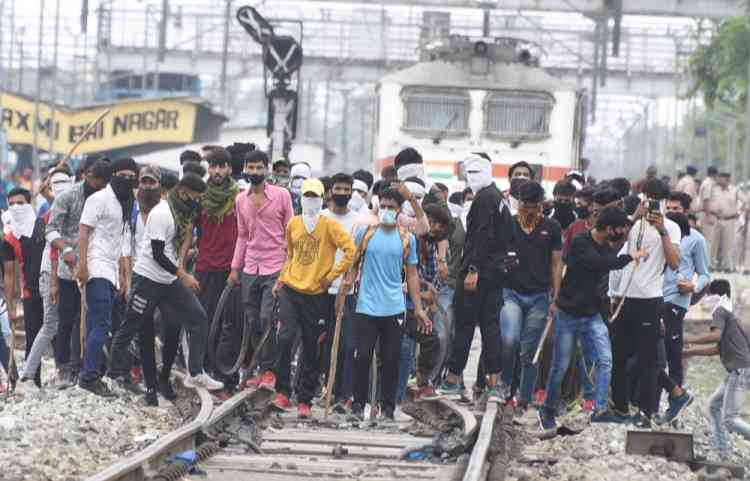As Agnipath fire singes India, some questions for our politicians (IANS Column: FairPoint)
Agnipath -- whenever one comes across this word, one is reminded of the 1990 Amitabh Bachchan film, 'Agneepath', which was also the title of a famous motivational poem by his father, Harivansh Rai Bachchan. The Hindi word literally means 'the path of fire', but it now seems as if the country is literally walking on one.

Deepika Bhan
Agnipath -- whenever one comes across this word, one is reminded of the 1990 Amitabh Bachchan film, 'Agneepath', which was also the title of a famous motivational poem by his father, Harivansh Rai Bachchan. The Hindi word literally means 'the path of fire', but it now seems as if the country is literally walking on one.
The last fortnight has seen tumultuous events rocking the country -- a situation that should be an eye-opener on how playing politics on sensitive issues can land a nation in trouble and pit its own people against each other.
If a TV debate exposed the vicious nexus of politicians and religious leaders, violence during protests against the new defence recruitment plan without understanding it fully has once again exposed deep-rooted insecurities in our society. It is the vulnerability of the masses that comes in handy for the opportunists, who can be inside as well as outside the country.
The fallout of the controversial remarks on the Prophet by a BJP leader showed how international powers can play dirty. Likewise, the violent protests against the Agnipath scheme prove that vested interests can manipulate young minds.
Who were the instigators?
The horrifying images of burning trains in Bihar and Telangana and vandalised railway stations in several other states have rattled the nation. The young people resorting to such violence even before understanding the scheme point to the extent manipulation of insecurities can play a part.
Bihar was the first to witness the violence soon after the scheme was announced on June 14. Why did this happen? Perhaps the answer can be found in what the Patna District Magistrate Chandrasekhar Singh is reported to have said on Saturday. He said that CCTV and other video footage as well as WhatsApp messages of some coaching centres were found on the mobile phones of the arrested students. The role of coaching centres in inciting the violence will be probed, he said.
Even in Secunderabad, the police have identified a few people, including the owner of a private coaching centre, who allegedly instigated the job aspirants to resort to violence at the railway station on June 17. It is being reported that messages asking the aspirants to assemble were circulated in a group called 'Hakimpet Army Soldiers', allegedly created by the coaching centre owner.
The coaching centres fear a loss of business once the scheme is rolled out, hence they instigated the young men.
In the row fanned by Nupur Sharma and Naveen Kumar, the issue was blown up about a week after the comments were made. Sharma's statement was used by Alt News co-founder Mohammed Zubair, after which an outrage was unleashed.
Sharma unconditionally withdrew her statement and the BJP suspended her and expelled Naveen Kumar, but the rage turned into a fireball. Several Muslim religious leaders issued death threats to Sharma and led violent protests in many parts of the country. AIMIM and other political parties played to the gallery.
Several Muslim nations condemned the statement. The US, too, red-flagged the comments.
What explains the international condemnation without a verification of the facts? The reason is not very far to locate. It is the Russia-Ukraine war and the politics of oil. Though India has condemned the Russian invasion, it has rejected the US-led sanctions against its old partner. India has been buying oil from Russia and the US is not happy about it.
Hence, when the Prophet controversy broke out, the Islamic countries reacted and the US too jumped in. Sources say that the US instigated the countries to up the pitch to corner India.
Do our politicians keep failing us?
Whether it was the Prophet row or the raging protests over the Agnipath scheme, the politicians have found opportunities to manoeuvre opinions.
The Agnipath protests have caused losses of thousands of crores. In Bihar, the BJP has pinned the blame on the Rashtriya Janata Dal. The Union Minister from Bihar, Giriraj Singh, said the RJD's violent protests have led to the burning down of government property and led Biharis to their death. He said Bihar will have to give a befitting reply to the RJD.
In Hyderabad, some protesters said that those who were vandalising public property had been sent by some politicians. The fact that only railway property was targeted in the Agnipath violence is baffling.
At the forefront of the violent agitation is the Left students' organisation, AISA. In Bihar, the RJD has actively supported the agitation and the BJP's ally, Janata Dal (United), has adopted a sympathetic attitude towards the protesters, who have also targeted the BJP leaders and their offices.
The houses of Bihar Deputy Chief Minister Renu Devi and the BJP state president and West Champaran MP Sanjay Jaiswal have come under attack. The BJP alleged that in the garb of youth protests, the attacks were motivated.
The Congress has extended its satyagraha against the Enforcement Directorate action on Rahul Gandhi to the Agnipath protests, although certain leaders, such as Manish Tewari, have praised the scheme.
The BJP's failure to make a convincing case on the now-repealed farm laws seems to be playing out in the Agnipath case too. The instigators were quick to create doubts, but the ruling party has been unable to put the positives across.
Even in the Prophet controversy, BJP was rattled at first by the growing negativity within the country and in the Muslim nations. When the country seemed to be getting overwhelmed by the emotions as a result of the controversy, no political leader came out to douse the flames. Most of the opposition parties feared losing vote banks, so either kept silent or spoke against Nupur Sharma and the BJP.
What and how the case was portrayed to the world and how TV networks jumped on it should be a cause of worry for the country's intelligence, security and political establishment. It took a Pakistani Maulana whose video has now gone viral to put the Prophet row in perspective. What he said should have been the line of Muslim leaders and scholars closer home. Instead, they instigated people with their statement and created a negative image of the country on global platforms.
Who will douse the fire?
The past fortnight's mayhem has created a deep sense of insecurity all around the country. Whether it is communal hatred or motivated violence in the name of a recruitment policy, the country is on an Agnipath.
The frequency with which riots, arson and looting are occurring means that there is a well-oiled internal system that enables this to happen in several places at the same time. And helping the internal network are the external forces which have their own axes to grind.
(Deepika Bhan can be reached at [email protected])


 IANS
IANS 








